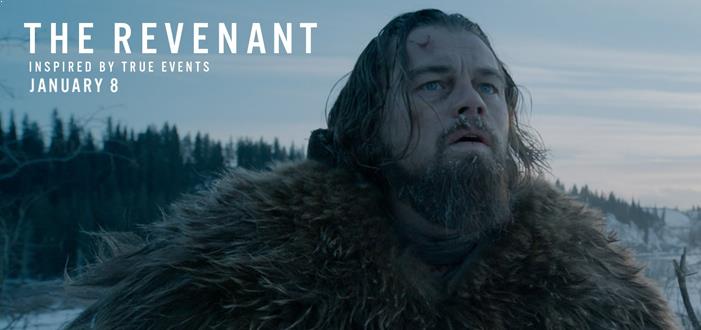
The Revenant
While The Revenant is a gorgeous advancement in the telling of cinema, and its narrative is simple-minded, it nevertheless does reach into the truths about the human condition in a novel manner. Painting lipstick on a pig does not change the innate nature of the animal, though luckily the heart and soul of the film was not similar to being a foul swine.
We are introduced, or more appropriately and splendidly, thrown into the hunting party of Americans which can only be measured to be somewhere close to the turn of the 18th century, judging by the lack of sophisticated firearms used. We witness the protagonist, Glass, and his dalliance with the natives in the land become mauled by nature and left for dead by the nature of man. I explicitly do not say he was mauled by a bear, as the film makes the wilderness and the wild as convincingly a supporting actor as any film in recent memory, or even in cinematic history. And the director, Mr. Inarritu, does such a masterful job at presenting its lush rawness as something that effortlessly brings men to their knees. It is a harshness that is forgotten in time by the city dweller to even the present day subsistent farmer and hobbyist hunter. We only make note in our contemporary lives of how wicked Mother Earth can be when it is noted in the news every summer or two of a hiker that becomes lost and dies in the wild.
The Revenant tries its best to hold back being politically judgmental of the white man and his encroachment onto Native soil – we only hear one quip from one of the violent Indians about the land being taken from them; never mind the actual reality where bands of Natives were at constant struggle with one another for the same land. Thusly, to paint the Redskin as a homogeneous entity with sole possession of the furs which they became rich from trading only in contact with Europeans who needed it for their continental fashions, is myopic and eagerly foolish. While one cannot expect otherwise from emanating out of Hollywood, one mustn’t relinquish criticism of such historical depravity which insinuates White equals bad and Red equals good.
Ultimately, however, we are exposed in the film to the sheer tenacity of a human’s ability to survive. And what can sustain a man to continue to march onward versus simply giving up to be taken by the harsh landscape he is fighting not to succumb to. What sustains Glass is an idealism, one pertaining to revenge. In his mind, justice, of course. Setting the world right you might say, though there is no appeal to a higher authority until the sparked at the very end, in a quite poetic manner which would have been more rhapsodic had the film been balanced in meditating on this point further, rather than being distracted by the beauty of the danger of nature.
The ending perplexes many, therefore, because they do not see the reason why when Glass has achieved what he aimed to do with his life he has no more meaning or purpose to continue it. It would be implausible, of course, to consider such a rapscallion to have any pretense of compassion or even a Christian forgiveness of those who have sinned against him; such men are not attracted to the wild which can take their life away on a whim; such men find excitement in living their lives to the fullest, and would consider such fulfillment in retaliation and retribution over something more humbly meek such as love. All to say, the wildest men which can still find a highness to submit to will always carry onward to annihilate men who find God to be a meaty squirrel at the end of the day.

